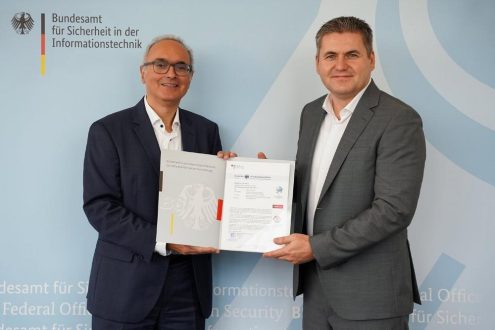Deepfake detection research funded by German Federal Ministry of Education and Research
The main goal of the FAKE-ID consortium is to develop a deepfake detection software with the help of artificial intelligence (AI). For this, the technical basics of deepfakes as well as the procedures behind their creation are examined. Based on the outcome, algorithms will be developed to expose manipulated photos and videos. The deepfake detectors are designed to support decisions in court, remote identity verification processes, etc. In addition, legal and socio-ethical research on the use of AI for the detection of deepfakes is undertaken. In the context of technology assessment, the project consortium gives particular consideration to the impact of the detection software on the fundamental rights of individuals as well as the implications for society.
What is a Deepfake?
The term “Deepfake” results from merging the words “Deep Learning” and “Fake”, highlighting the usage of machine learning methods to create manipulated photo, video and audio material almost autonomously. Over the years the quality and quantity of deepfakes has increased immensely with the creation process becoming ever easier. If forged professionally, the identification of a deepfake is almost impossible for the bare eye. Therefore, the potential destructive nature poses a threat for society, politics and other areas of life.
As a countermeasure, forensic and biometric methods are required to reveal deepfakes and mitigate their potential misuse. The BMBF funded project was brought into life to increase trust levels and have effective mechanisms against fake news and fraudsters at hand.
From a practical point of view, fraud prevention through deepfake detection is highly relevant. Thus, the FAKE-ID project’s associated partners, among them Deutsche Post and the Federal Criminal Police Office Berlin, are highly interested in the conducted research.
Exposing Deepfake Presentation Attacks via Liveness Detection
BioID has developed software that can distinguish live persons from fakes to secure their customers’ identity verification and authentication processes. Through capturing the motion on two face images and combining this with artificial intelligence, BioID’s liveness detection can therefore identify deepfake presentation attacks. The next step and the ongoing subject of the consortium’s research is the detection of manipulation within the photo and video material directly.
“Deepfakes are created with machine learning methods that are similar to certain parts of our liveness detection solution. The aim is to combine our two decades of experience in biometrics with the latest artificial intelligence to stay ahead of impostors and defy deepfakes in any scenario.”, says Dr. Robert Frischholz, BioID CTO.
BioID offers liveness detection, facial authentication & identity verification as a Service. With more than 20 years of experience BioID’s special focus is biometric anti-spoofing Made in Germany. In line with this, the company’s facial authentication service offers data privacy and security by design. BioID is guided by the vision to enable software-based biometric verification – with any device, for any application. Privately held, with R&D based in Germany, BioID has proven its technology through many years of use at enterprises, banks and government organizations.
Contact us for further information and test our biometrics at https://playground.bioid.com
BioID GmbH
Bartholomäusstrasse 26D
90489 Nürnberg
Telefon: +49 (911) 9999898-0
https://www.bioid.com
Telefon: +49 (911) 9999898-0
E-Mail: press@bioid.com
![]()




